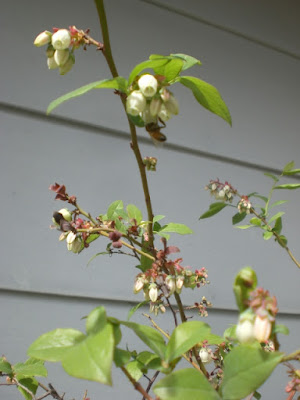 |
| See the bee? (It's on the bottom of the second blossom clump down) |
But a recent day, working near blueberry bushes where bees were crawling in the plants' blooms, I mused, “Thanks for BEE-ing there, little winged friends.” I knew their hovering over the bushes' tiny white blossoms could mean a crisp, tasty blueberry in a few months. Last year I didn't have many blossoms (and nearly zero berries) so I stirred some concoctions into the soil....and waited. This year the bee battalion came. Check with me the end of the summer to see if these black-and-yellow hovering insects did their magic.
I know I'm not the first human to stop and consider the bee. And probably not the first to pause a moment whenever I encounter “bee” or “honey/nectar” references in the Bible. These amazing insects and their golden, edible product have been around a long time! Probably the best known ”honey verse” comes in the conclusion of Psalm 19:7-10—that all the laws and ways of God are “more precious than gold; they are sweeter than honey, than honey from the comb.” Others:
“How sweet are your promises to my taste, sweeter than honey to my mouth!” (Psalm 119:103)
“Eat honey, my son, for it is good; honey from the comb is sweet to your taste. Know also that wisdom is sweet to your soul.” (Proverbs 24:13-14)
Love-sick King Solomon had a different analogy for his beloved: “Your lips drop sweetness as the honeycomb, my bride; milk and honey are under your tongue” (Song of Songs 4:11). I don't think he was referring to the menu for the wedding reception! Or a flavored lipstick.
Oh yes, strong man Samson also ate honey from a hive he found in a lion's corpse (Judges 14). I'm sorry, but, UGH!
A negative analogy: “The lips of an adulteress drip honey, and her speech is smoother than oil, but in the end she is bitter as gall....” (Proverbs 5:3-4). In other words, “bee” careful (sorry). Flattery that seems sweet can be bitter if it comes from a cloyed heart.
Could Jesus have Jesus enjoyed some raw honey while on His earthly rounds? Why not? No doubt He saw bees swarming around a hive. Though it's not in His recorded words, those bees certainly illustrated one of His final admonitions. Through a parable of a departing landowner giving instructions to his workers, the Lord gave this poignant command: “Occupy until I come” (Luke 19:13). “Occupy”--be at diligent work. Dare I say, like bees?


